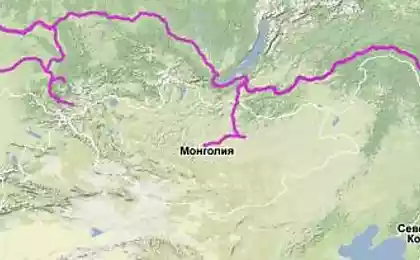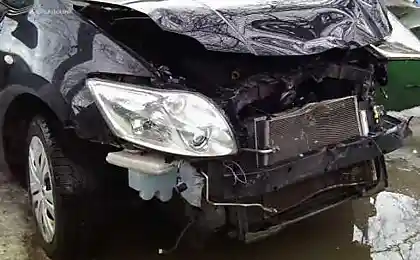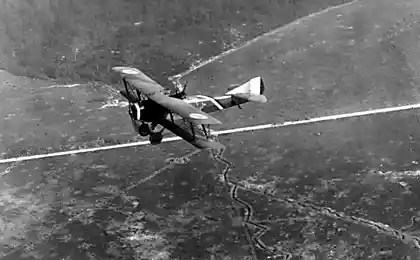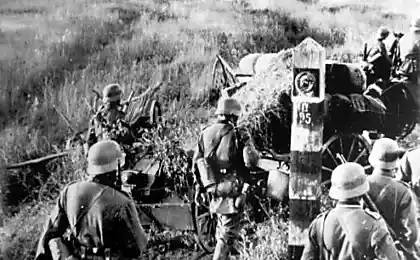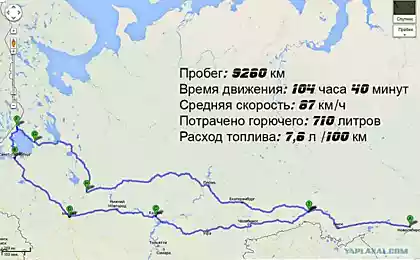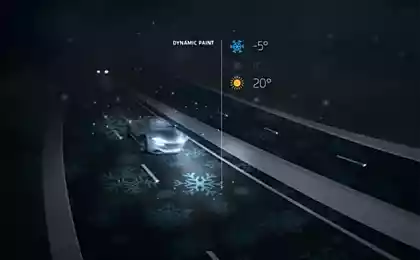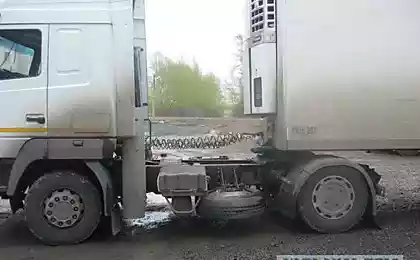592
German asphalt broke down and cracked ...!
Such roads Germany has never known! Potholes, ruts, cracks, broken asphalt ... To fill holes, which left on German roads this winter, will require at least three billion euros.
«Schlagloch», - note the word! It can be a "word of the year" in Germany. That's what the Germans call the potholes on the roads. Now it sounds very often, even where the road surface any problems so far did not know. After this winter all drivers - and residents and tourists, and those who travels to Germany in transit - should be prepared for unpleasant surprises. Only in one Hanseatic City of Luebeck counted 14 thousand potholes! Experts Society for Technical control and supervision of TÜV Rheinland suggest that Germany is now 30-40 percent of the damaged pavement.
3 photos via Steer ru
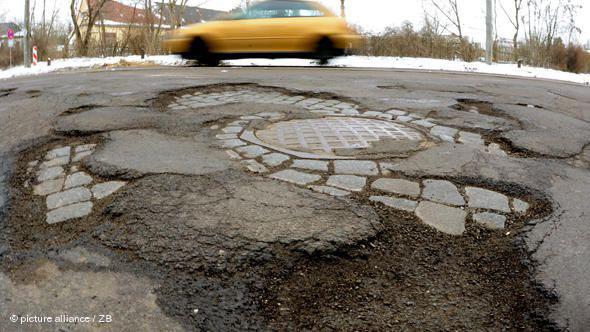
"Siberian" cold
The winter was unusually long, snowy and cold. Such cold weather forecasts that television commentators called the cold "Siberian" and even added that they (frost) tie Germany: «Sibirische Kälte hat Deutschland fest im Griff» ...
It should be noted that the "Siberian" Germans call cold when the temperature reaches about -15 or -10 degrees. For Germany (except perhaps the Alpine foothills of Bavaria) unusually cold. And that was enough to make the streets of German cities, new holes, cracks and potholes. Moreover, in such quantities that their repair, even cosmetic, can supply many local budgets to the brink of bankruptcy if they do still have "free" money. The long and cold winter for roads proved to be a catastrophic disaster, the mechanism is very simple: water freezing in cracks, the ice broke the cover, and heavy traffic is doing its job ...
Traffic statistics
According to the estimates of specialists all-German automobile club (ADAC), only for the repair of roads and streets, administered by the local authorities, that is, cities and rural communities, it will also need more than three billion euros! Closer to spring, when the full impact will become apparent, the amount has increased, experts predict.
At the same time last year for the construction and maintenance of urban roads and local utilities in Germany it spent five billion euros at the required eight billion. This chronic underfunding is one of the reasons why the "Siberian" cold so hurt the German asphalt. Where thinly, there and tear.
According to the Automobile Club ACE (Auto Club Europa), the total length of urban roads and local municipal reference in Germany is 400 thousand kilometers. Of these, until recently, without taking into account the effects of this record-breaking winter repairs needed 64 thousand kilometers. The club even posted on its website a special form, that can be used to inform the authorities about potholes and other damage.
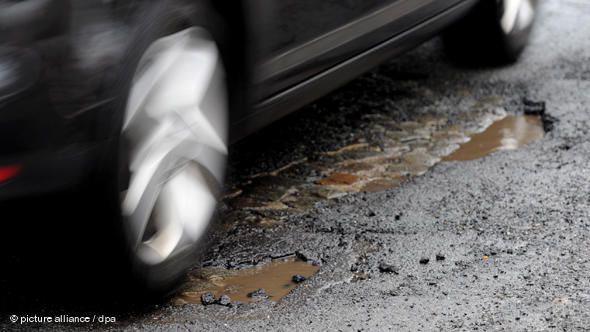
Road federalism
Note that while it was only on local roads. But in the winter at least suffering highways (Autobahn) and federal highways (Bundesstrassen), under the responsibility of the federal government. Additional costs are expected budgets and land. Of these, financed the construction and maintenance of highways land (Landesstrassen). They should not be confused with «Landsstrassen». So-called ordinary roads between settlements, regardless of funding and responsibility, as well as country roads.
Of course, when it comes to injuries, it does not mean that the German track was because of them impassable. Statistics records, for example, and cracked. But in some cases the authorities had to resort to emergency measures. In early February, for emergency repairs for about half closed to traffic a 13-kilometer stretch of the federal highway A1. The event is so rare that it was informed of all the news channels. Shortly before that, more than a day was closed by another highway, but for another reason: in the division on its service over road salt. As a result, the resulting ice for an hour or two in a small area there were more than a dozen accidents. The fast lane was closed and allowed to bypass the traffic at a "slow" roads.
February 22, the Federal Ministry of Transport reported that the German Government the opportunity to check the allocation of additional funds for the repair of federal roads.
Patching holes
Some urban municipalities that do not keep patching up holes road already closed for the movement of whole streets. More often - put speed limit signs to 30 kilometers per hour, that at least in such a way to ensure the safety and fence themselves from lawsuits car owners who have received damage if it enters the pits and potholes. On some motorways, speed is limited to 80 kilometers per hour. In turn, the experts of automobile clubs point out that such measures do not correct the situation and calling for an overhaul.
"Spin" consequences
But the potholes on the roads and the need to repair them - not only the financial implications of "Siberian" winter in Germany. Throughout almost doubled the cost of cleaning the streets from snow and flouring them with salt. For example, in Hamburg - 6, 9 million euros to 10 million euros per season.
In addition, the increased costs of insurance companies. For three months, starting in December, the number of accidents by as much as 55 thousand higher than last year's figure. It is estimated that the additional costs of insurers will be around 230 million euros.
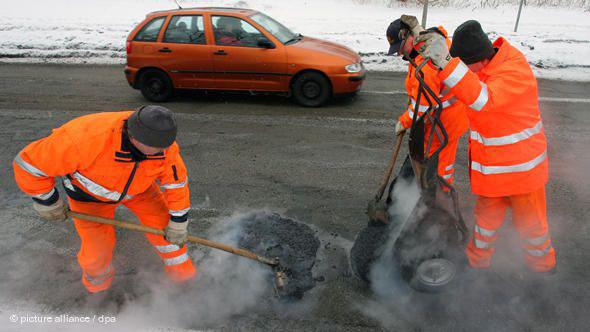
Source:
«Schlagloch», - note the word! It can be a "word of the year" in Germany. That's what the Germans call the potholes on the roads. Now it sounds very often, even where the road surface any problems so far did not know. After this winter all drivers - and residents and tourists, and those who travels to Germany in transit - should be prepared for unpleasant surprises. Only in one Hanseatic City of Luebeck counted 14 thousand potholes! Experts Society for Technical control and supervision of TÜV Rheinland suggest that Germany is now 30-40 percent of the damaged pavement.
3 photos via Steer ru

"Siberian" cold
The winter was unusually long, snowy and cold. Such cold weather forecasts that television commentators called the cold "Siberian" and even added that they (frost) tie Germany: «Sibirische Kälte hat Deutschland fest im Griff» ...
It should be noted that the "Siberian" Germans call cold when the temperature reaches about -15 or -10 degrees. For Germany (except perhaps the Alpine foothills of Bavaria) unusually cold. And that was enough to make the streets of German cities, new holes, cracks and potholes. Moreover, in such quantities that their repair, even cosmetic, can supply many local budgets to the brink of bankruptcy if they do still have "free" money. The long and cold winter for roads proved to be a catastrophic disaster, the mechanism is very simple: water freezing in cracks, the ice broke the cover, and heavy traffic is doing its job ...
Traffic statistics
According to the estimates of specialists all-German automobile club (ADAC), only for the repair of roads and streets, administered by the local authorities, that is, cities and rural communities, it will also need more than three billion euros! Closer to spring, when the full impact will become apparent, the amount has increased, experts predict.
At the same time last year for the construction and maintenance of urban roads and local utilities in Germany it spent five billion euros at the required eight billion. This chronic underfunding is one of the reasons why the "Siberian" cold so hurt the German asphalt. Where thinly, there and tear.
According to the Automobile Club ACE (Auto Club Europa), the total length of urban roads and local municipal reference in Germany is 400 thousand kilometers. Of these, until recently, without taking into account the effects of this record-breaking winter repairs needed 64 thousand kilometers. The club even posted on its website a special form, that can be used to inform the authorities about potholes and other damage.

Road federalism
Note that while it was only on local roads. But in the winter at least suffering highways (Autobahn) and federal highways (Bundesstrassen), under the responsibility of the federal government. Additional costs are expected budgets and land. Of these, financed the construction and maintenance of highways land (Landesstrassen). They should not be confused with «Landsstrassen». So-called ordinary roads between settlements, regardless of funding and responsibility, as well as country roads.
Of course, when it comes to injuries, it does not mean that the German track was because of them impassable. Statistics records, for example, and cracked. But in some cases the authorities had to resort to emergency measures. In early February, for emergency repairs for about half closed to traffic a 13-kilometer stretch of the federal highway A1. The event is so rare that it was informed of all the news channels. Shortly before that, more than a day was closed by another highway, but for another reason: in the division on its service over road salt. As a result, the resulting ice for an hour or two in a small area there were more than a dozen accidents. The fast lane was closed and allowed to bypass the traffic at a "slow" roads.
February 22, the Federal Ministry of Transport reported that the German Government the opportunity to check the allocation of additional funds for the repair of federal roads.
Patching holes
Some urban municipalities that do not keep patching up holes road already closed for the movement of whole streets. More often - put speed limit signs to 30 kilometers per hour, that at least in such a way to ensure the safety and fence themselves from lawsuits car owners who have received damage if it enters the pits and potholes. On some motorways, speed is limited to 80 kilometers per hour. In turn, the experts of automobile clubs point out that such measures do not correct the situation and calling for an overhaul.
"Spin" consequences
But the potholes on the roads and the need to repair them - not only the financial implications of "Siberian" winter in Germany. Throughout almost doubled the cost of cleaning the streets from snow and flouring them with salt. For example, in Hamburg - 6, 9 million euros to 10 million euros per season.
In addition, the increased costs of insurance companies. For three months, starting in December, the number of accidents by as much as 55 thousand higher than last year's figure. It is estimated that the additional costs of insurers will be around 230 million euros.

Source:
